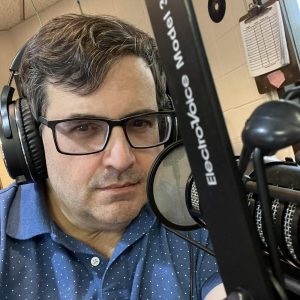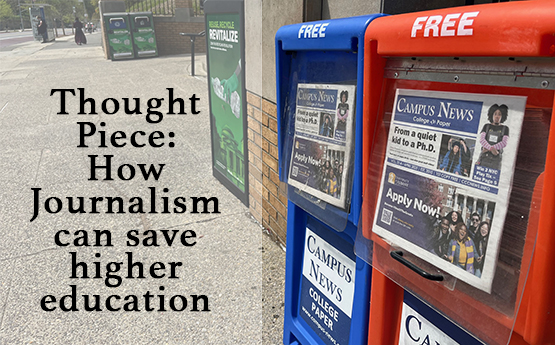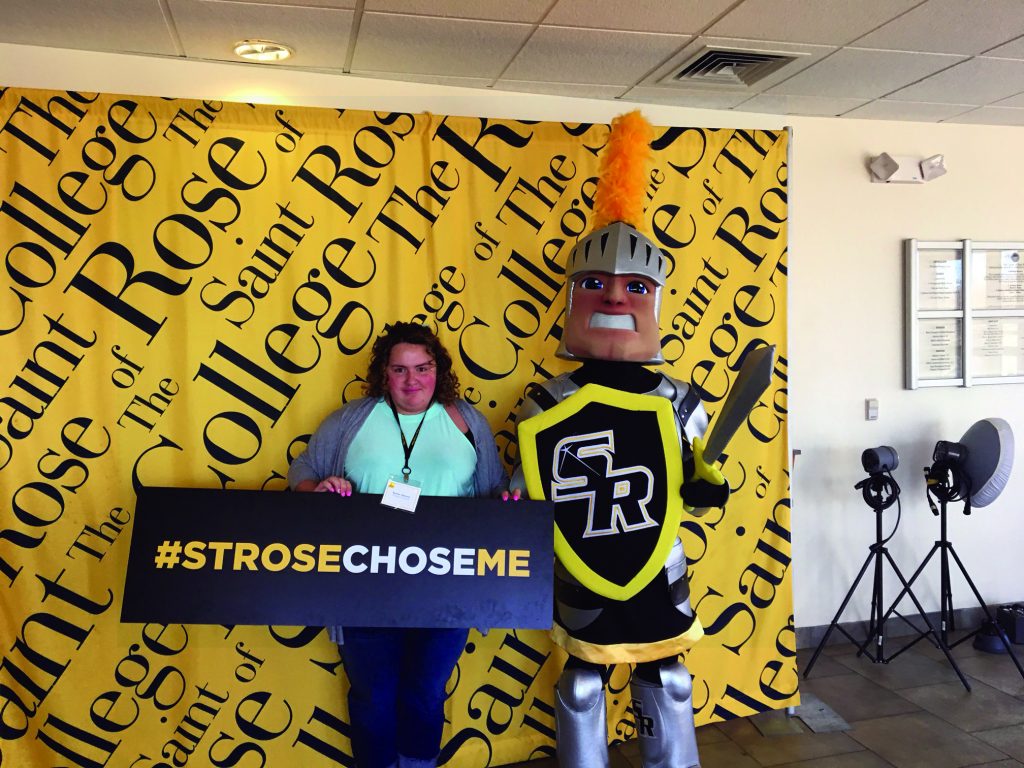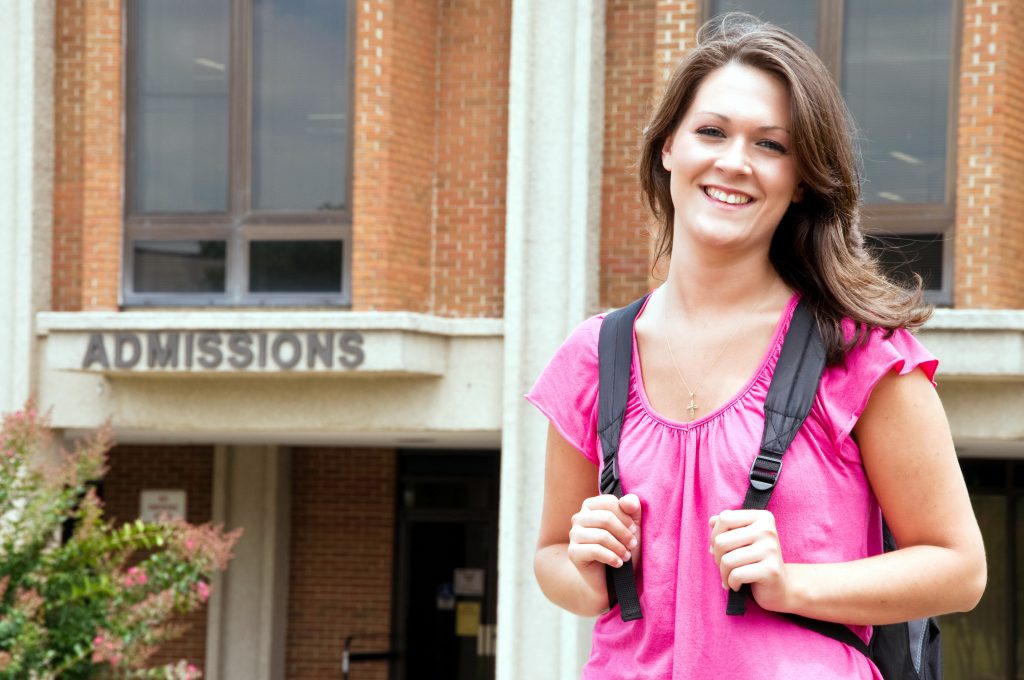By Darren Johnson
Campus News
The university system is in an existential crisis.
And it can be saved via Journalism – both the academic discipline, with a capital “J,” and the practice of it.
Already for years, public perception had grown to the point where most people now question whether having any degree is worth it anymore, considering the high cost of tuition and diminishing white-collar job prospects.
But more recently, the university business model is under assault from AI, in two ways:
- AI will replace many jobs in the future, thus further lessening the vocational value of a degree; and,
- Students, and even some professors, are using it as a crutch, essentially short-changing their way through college – and themselves – by not learning how to do their own research and writing.
Below – speaking as someone with English degrees who instead teaches in the Journalism niche, and as a journalist myself; and as someone who had previously taught traditional English composition courses, among others – I will discuss how the Journalism track is the way to go for colleges, academically and from a community relations standpoint, so that colleges can save themselves, before it’s too late.
(I belong to several college discussion groups related to AI in higher education, as well as Journalism, so base my reasoning below on the thousands of posts I have read from these groups.)
First, adding to point No. 2 above – how people are “cheating” with AI and programs like ChatGPT, which in a previous era would be considered plagiarism and an offense that would merit an “F,” at least, if not suspension; today, many professors are conflicted.
Student use of AI is rampant. Why?
- Some professors don’t consider this use “cheating,” because AI exists as a practicality now. Students may as well get used to it, because it will be a part of their future employment.
- Some professors don’t like it, but they feel uncomfortable giving an F to a student who uses it because perhaps the students are being honest – they just happen to write in an AI-style. The AI detectors aren’t always accurate. The professors would feel guilty stereotyping and giving an F to such a student.
- Some professors use it themselves to write, so they don’t want a pot/kettle situation.
But whatever your stance on AI use, is it making the professor obsolete?
A college has to offer a unique value to keep those tuition dollars rolling in. Professors need to justify their human existence to stay employed.
At all except for the most elite universities, enrollment is starting to dwindle. As for the elite universities, they are facing dwindling federal funding and perhaps far fewer international students, due to new federal visa restrictions.
To sum up the problem:
- Colleges are at the edge of an enrollment cliff.
- AI is making things worse for them.
So, let’s get to how Journalism is the answer to these problems.
Journalism as an Academic Discipline
Journalism teaches writing and research, like a lot of other disciplines, but in a different way – a way that can’t be faked, at least not ethically.
That’s because while a journalist does do secondary research – as background – it’s the use of primary sources that make journalism journalism.
Newspapers have been described as the first crack at writing history.
Journalism requires interviewing real people, real experts, and getting them on the record.
It’s researching/preparing questions, setting up live interviews, conducting them professionally and then getting accurate transcripts of each interview and composing a story in an interesting, time-honored, mainstream way, based upon all of this preparation and research.
The way I teach Journalism, and probably most instructors do this too, is first learning how to create questions and interview as part of the process. Then execution. We want to see the messy notes and transcript. We want to hear the recording of the interview. We want to see a really rough draft and then teach copy editing skills, going back and forth with the story until the piece is publishable (in the school paper, perhaps).
And in the world of journalism, plagiarizing – or anything close to it – is a high crime. There are numerous examples of bad (former) journalists we can tell students about. They can watch the very entertaining movie “Shattered Glass” for a cautionary tale.
Originality is a part of the ethos, so a Journalism instructor need not feel any guilt for giving an “F” to a student who fakes gathering primary sources. It’s clearly against the rules.
Another thing, prioritizing primary sources over secondary sources forces students, most of whom tend to be shy, to at least attempt an extrovertive persona – a useful skill in the workforce, to be able to turn “on” such a persona, as needed.
This all doesn’t have to just be writing. An instructor should explore other mediums as well, such as audio and video. This teaches a student to multi-purpose their work.
In my most recent stint as a Visiting Assistant Professor of Journalism, I also had an FM radio station to play around with. Its signal traveled about 15 miles out into the community. In class, I’d put students straight on the air – it was like a public speaking class on steroids. They started the semester nervous and unsure of their words, and by the end of the semester, they were smooth talking and very aware of the idea of “audience.” They all cited the class as transformative.
I’d also contend that the Journalism writing style is more useful in the mainstream as compared to traditional research writing. Cops and lawyers can use it, medical professionals, technical writers, policy wonks, marketers, etc., as well as journalists, of course.
I’d further contend that research using primary sources – live interviewing – is more useful in the mainstream as compared to traditional library research of secondary sources – books written by people who had scoured through primary sources.
And that’s essentially what AI does – scouring the web to sum up others’ work. But humans can be original, finding new information.
Journalists are creators in what’s now a creator economy.
So, that’s Part I of my suggestion as to how Journalism is an AI-proof solution to the academic crisis in Higher Ed.
How to implement it? Allow Journalism 101 (or whatever the course is called at your university) to be a substitute for your Freshman Composition course (often that’s labeled English 101 or similar). Journalism 102 can be a substitute for a secondary composition course. More Journalism courses can be allowed into the academic core, as well. Let the students choose which track they’d like to take.
As well, maybe other classes – like History, Psychology, Sociology, Political Science – could incorporate more of the primary research techniques journalists use.
(I am aware that there would be a lot of academic politics around adding more Journalism courses at the expense of traditional English Composition courses, and that there are many more English terminal-degree holders vs. Journalism, which tends to get lumped in with Communications at most colleges. Many colleges require terminal degrees to teach most courses full-time. This all would have to be finessed, but perhaps some English professors could transition to teaching Introductory Journalism as a style of writing.)
Journalism as Practice
Now here is Part II, and some colleges are currently doing this. There’s actually a whole national movement to promote this:
College media outfits should report on their larger communities.
In the past, student papers mostly just covered what’s going on on campus. But many campuses now use their Journalism departments to cover regional news. This is important because so many commercial newspapers everywhere are dead or dying. College media is saving us from news deserts.
A typical campus may have a few dozen Journalism students on campus. Their talents are underutilized merely reporting on the bad food in the cafeteria and Professor X’s travel class to the Maldives. Why not send them into neighboring towns and have them report on crime, politics, municipal budgets and other things that matter to area residents, performing a larger public good?
(Professors and college staff also live in the nearby towns – they, too, would appreciate this coverage.)
This also makes the college a real player in the community, and builds a lot of goodwill at a time where the public seems to be turning against higher education.
(Yes, the public also seems to have a low regard for Journalism, too, but not necessarily at the local level.)
If the town’s commercial newspaper is now defunct, the college should revive that title and devote student journalists to staff it.
If the local commercial paper still exists, perhaps the local college should buy it as a learning lab for its Journalism students. Many tired newspaper owners are looking for an out. I bump into these people who contract their printing at a local printing plant. Make them an offer!
Every college with a Journalism program should own a community newspaper. Just like every law school should have a legal clinic for the community.
In short, this is how Journalism, the subject with a capital “J,” and journalism, the practice, can save higher ed:
- It can re-invigorate the curriculum, across Writing and other areas, and provide a firewall against the deleterious effects of AI.
- It can strengthen town-and-gown relationships and provide a genuine community good while also training students in an AI-resistant career; or at least providing skills that translate to other careers.
The college-in-the-community experience could be akin to what the Peace Corps was to a previous generation, a transformative experience these students will positively talk about their whole lives, making them stronger, deeper-rooted alumni, as well.

Darren Johnson is finishing a three-year post as a Visiting Assistant Professor of Multimedia Journalism at Massachusetts College of Liberal Arts. He has a BA and MFA in Writing & Literature from Southampton College. A longtime journalist, he owns three small New York-based newspapers: Campus News, The Greenwich Journal and The Salem Press. He looks forward to his next academic adventure starting this fall. Contact him at editor@cccnews.info.








Facebook Comments